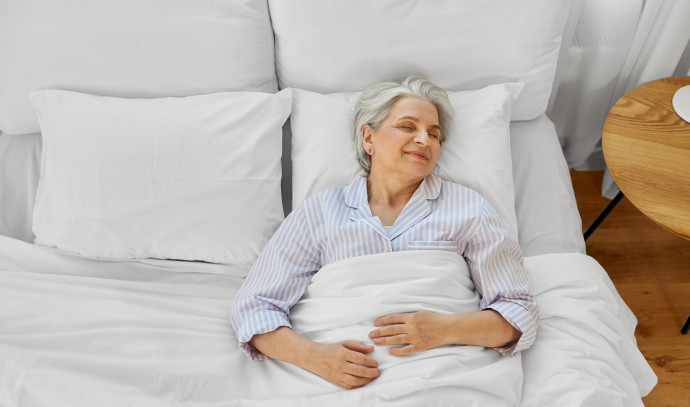Restful sleep depends not only on a good mattress. New research has found that sleep can be most efficient and restful for older adults when the nighttime bedroom ambient temperature ranges between 20 and 25 degrees Celsius.
The researchers at the Marcus Institute for Aging Research at Hebrew SeniorLife and Harvard Medical School with which it is affiliated observed an overall trend – a 5% to 10 % drop in sleep efficiency as the nighttime ambient temperature increased from 25 degrees to 30 degrees Celsius. The study also revealed substantial differences in optimal bedroom temperature among different people.
“These results highlight the potential to enhance sleep quality in older adults by optimizing home thermal environments and emphasizing the importance of personalized temperature adjustments based on individual needs and circumstances,” said lead researcher Dr. Amir Baniassadi, a research fellow specializing in environmental health and the well-being of older adults.
“Additionally, the study underscores the potential impact of climate change on sleep quality in older adults, especially those with lower socioeconomic status, and supports increasing their adaptive capacity as nighttime temperatures increase in cities across the country,” he added.
How to help older adults sleep
He and colleagues published their findings in the journal Science of the Total Environment under the title “Nighttime ambient temperature and sleep in community-dwelling older adults.” The longitudinal observational study examined the connection between bedroom nighttime temperature and sleep quality in a sample of older adults living in the community. Using wearable sleep monitors and environmental sensors, researchers monitored sleep duration, efficiency, and restlessness over an extended period within participants’ homes while controlling for potential confounders and covariates. The study collected nearly 11,000 person-nights of sleep and environmental data from 50 older adults.
The elderly often suffer from inadequate, restless, and disrupted sleep that influences many outcomes connected to their health and well-being such as cognitive and physical function, mood and affect, irritability and reaction to stress, productivity, diabetes management, and risk of cardiovascular diseases. In fact, while poor sleep is disproportionately more common among older adults, research on its causes has focused mostly on physiological and behavioral factors despite evidence suggesting that the environment the person sleeps in can be as influential.
While numerous medical and behavioral interventions have been developed to improve outcomes related to sleep, the potential of environmental interventions has been largely overlooked. Within this context, the link between home ambient temperature and sleep among older adults can be a potential target for improving sleep – which motivated the researchers to conduct this study.
The results highlighted the potential to improve sleep quality among the elderly by optimizing the ambient temperature in bedrooms and stressed the importance of personalized temperature adjustments based on individual needs and circumstances. The team will continue this line of work by focusing on the potential impact of climate change on sleep in low-income older adults and developing interventions to optimize their environment.



